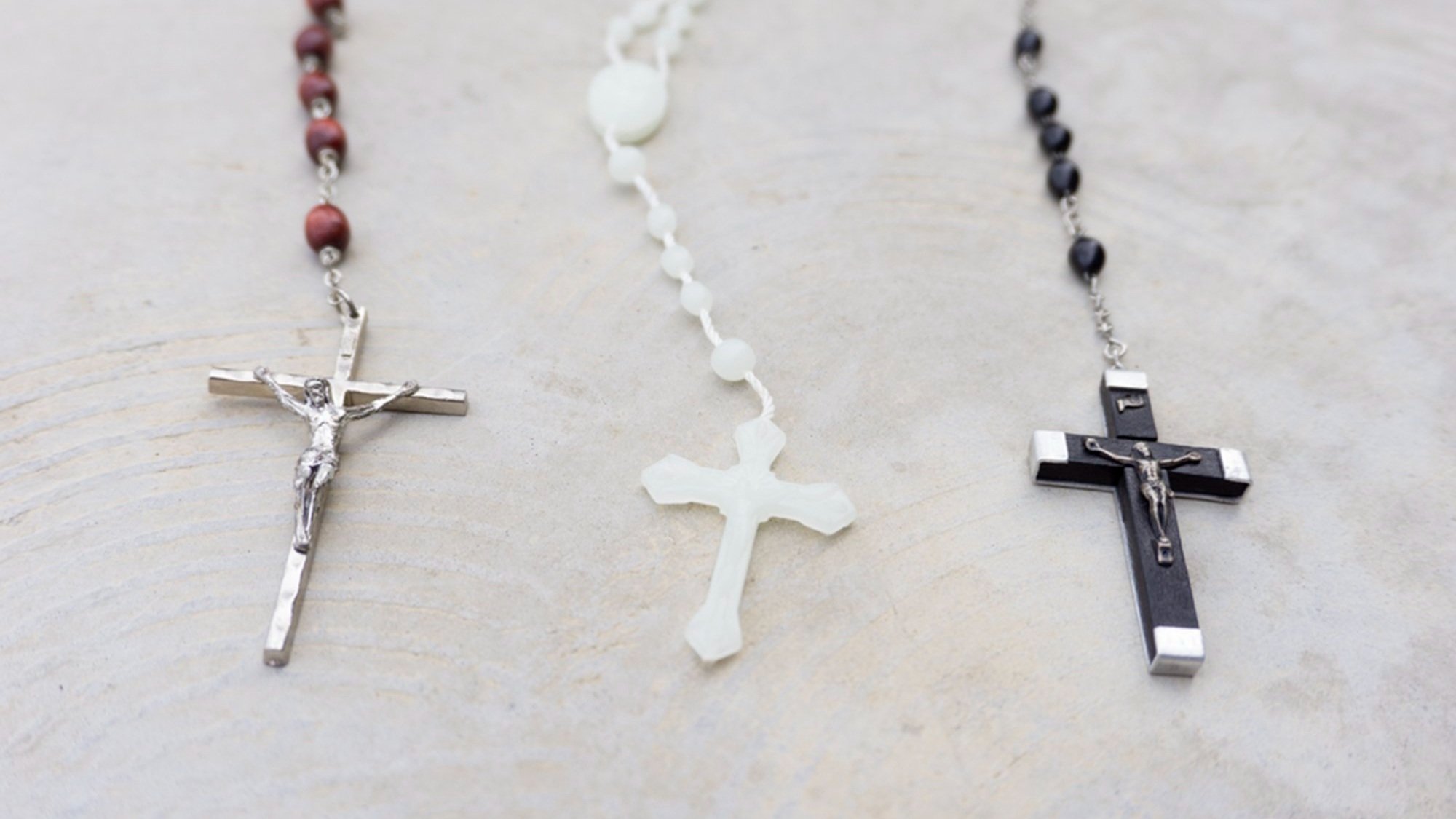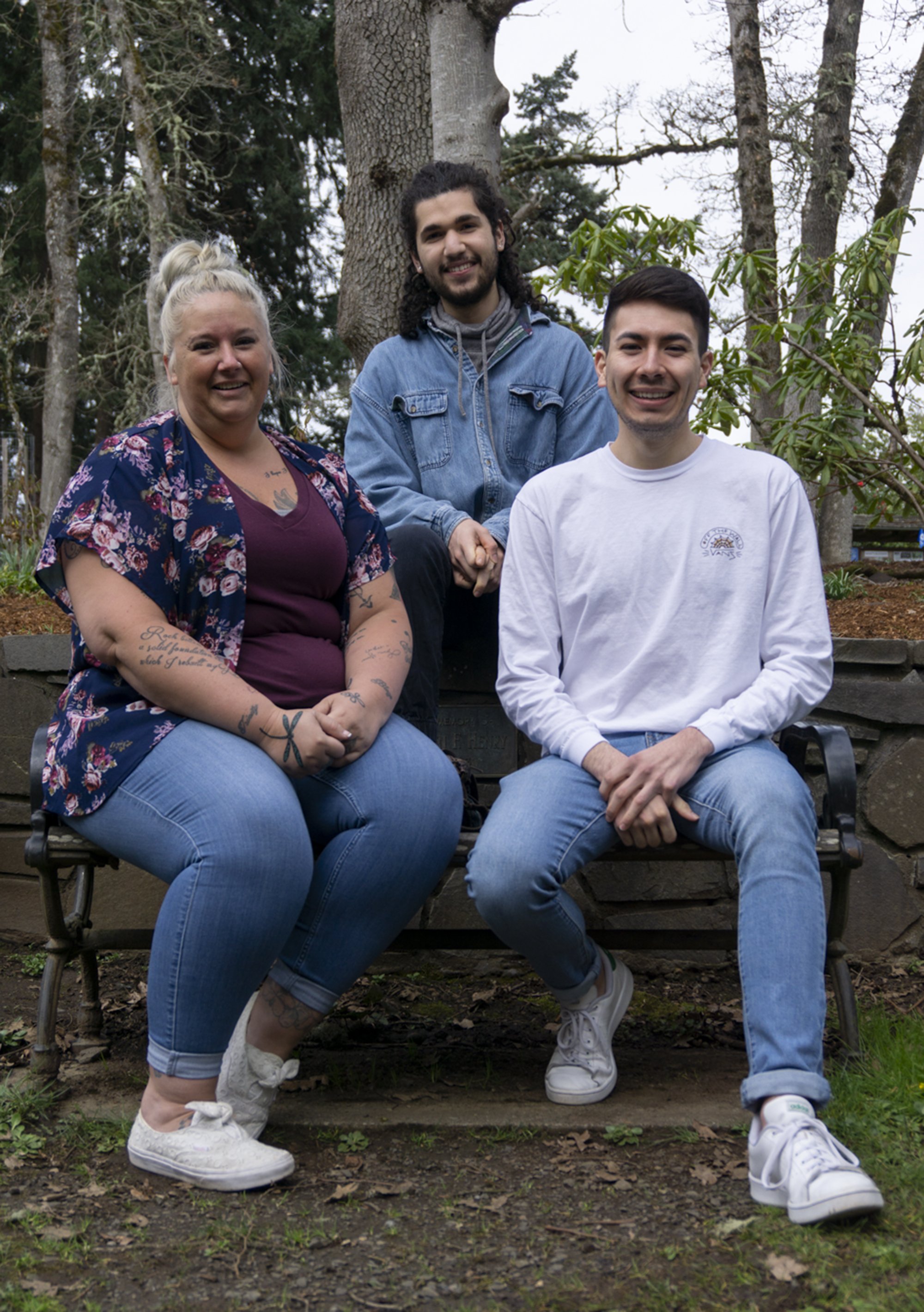Take Me to Church
Three UO students discuss how religion has shaped who they are and how it has affected the relationships they have built.
Interviews by BRIANNA MURSCHEL
photographs by AMALIA BIRCH
Worthington displays the three Rosaries he uses when he prays. The black one is from his grandfather and the white one is from his parish back home in Campbell, California. He uses the white Rosary the most, he says, because it is more durable than the other two; he doesn’t worry about carrying it around with him.
College students have a lot on their minds, from social life to exams to what restaurant serves the best pizza. But what about their thoughts on the weighty topic of religion? Along with politics, race, and ethnicity, religion used to be a taboo subject, something people chose not to discuss. As we know, of late politics, race, and ethnicity are frequently in the public discourse. But now even talk of religion is more open, as the following excerpts from interviews with three University of Oregon students show.
Tristen Mora
Year at the UO - Junior
Previously attended the Church of Jesus Christ of Latter-day Saints in Utah
When I was growing up my day-to-day was focused around the church. It was all I knew.
I was pushing against it because it was forced on me. I looked at the greener side of the fence where people did what they wanted. I was 16 or 17 when I started to push back. I thought it would be best for me. People noticed. They tried to push it on me a little more. I just ignored it.
I feel like [the church] shaped me into the person I am today. I am a genuinely nice person. The friends who are around me I treat as family, and I don’t treat anybody differently. I think that is the positive from growing up religious. I accept everyone around me as who they are, even myself.
I had a talk with my mom not too long ago. She said you can do what you want with your life, but as long as you know at the end of the line, God is there to accept you as you are. It was reassuring to hear.
Lately, more than before, I have thought about going back, but I don’t think I am ready yet.
Tristen Mora often comes to Mt. Pisgah to hike. He said it’s one of the ways he finds meaning in his life outside of religion. “I’ll just go out there and take my mind off things,” Mora says. Often when he is on these hikes, he says, he thinks about potentially going back to the church he attended as a youth.
Mora with his friends, Kendal Peterson (left) and Jean Carlos Ortiz-Orman (center). Mora says his friends mean a lot to him. He met Peterson when they were both working as phlebotomists in 2020; Ortiz-Orman and More are now roommates. “Having a good group of people around me,” Mora says, “it’s very lightening.
Kylia Dominoe
Year at the UO - Junior
Practices Christianity
I was born and raised a Christian. When I was younger church was more like “Oh, go to church, do worship.” But now worship is not necessarily singing and dancing; it’s like if I write in my journal and I am thinking about my life or talking to God. I pray regularly. I mostly do devotionals, which take verses of the Bible and tell you how to apply them to your life. It gives me a lot of drive to get through my day.
A huge way of practicing Christianity is giving back or giving service. I am currently interning with our church, so I am a youth mentor. We have a service on Wednesday for middle school and high school kids to come. We do worship, and then we have life group, so we just meet up with the students, talk about how their life is going and just help them navigate life as a Christian in this world.
My calling is to be a caregiver, in a way. Doing things where I am working with children. Being a caregiver and being a mentor makes me feel like I’m doing what I am supposed to do. It gives me purpose.
Bryce Worthington
Year at the UO - Junior
ROTC student and a Catholic
Every single day I pray, and I pray the Rosary. The beads help you count prayers. You are repeating the same prayers over and over again. By the 10th one it becomes mouth noise, but by the 20th, you are saying it with meaning.
Right now [early April] we are in Lent, so no meat on Fridays. I was in the field last weekend, and when I told [other ROTC members] I wasn’t eating meat on Fridays, they were kind of like, Why are you being difficult? But I’m not the only Catholic in ROTC.
I go to Mass every Sunday, and I’ll go to a Newman Catholic Center event if it’s something I find interesting. A lot of times it’s Adoration, which is two hours of sitting in the chapel, and it’s very silent. It’s a very nice experience. I always thought of going to church as a centering thing.
Had I not grown up in any kind of religion, I probably wouldn’t be as nice to people around me.
Worthington says when he prays, he runs his fingers along the Rosary, counting the prayers with each bead so he doesn’t lose his place.
University of Oregon student Bryce Worthington sits outside St. Thomas More Newman Center, where Catholic students such as him can attend Mass, study or hang out and participate in social events. Worthington says one thing he loves most about being Catholic is the community. “We’re all very together and we’re all very welcoming.”






